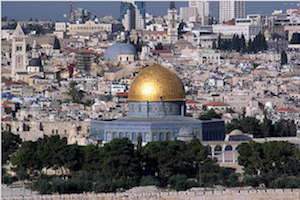Netanyahu's Statement on the Armenian Genocide and Its Implications for the South Caucasus and the Levant
By Vali Kaleji
On August 27, Israeli Prime Minister Benjamin Netanyahu made the unprecedented statement that he recognizes the mass killings of Armenians, Assyrians and Greeks in the early 20th century Ottoman Empire as genocide. Armenia dismissed the gesture as insincere and opportunistic, given Israel’s military cooperation with Azerbaijan and Yerevan’s ongoing normalization talks with Ankara. Netanyahu’s recognition and its aftermath signify the contradictions of the new regional order emerging between the South Caucasus and the Levant.
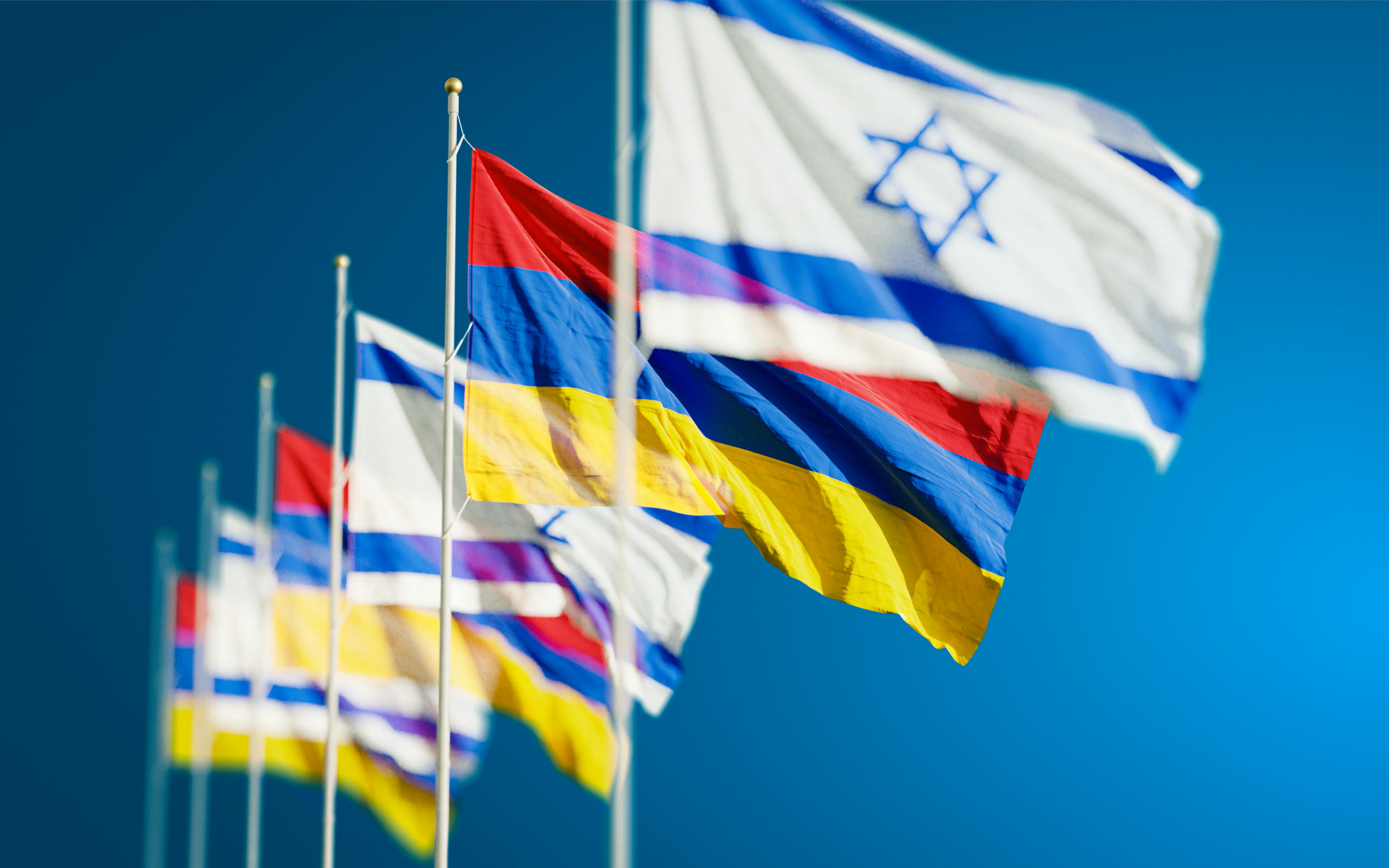
Credit: Pexels
BACKGROUND: To maintain ties with Türkiye, Israel had long avoided officially recognizing the mass killings of Christians in the early 20th century Ottoman empire as genocide. When asked by Patrick Bet-David on his podcast why Israel does not recognize the Armenian genocide, Netanyahu said, “I think we have. I think the Knesset passed a resolution to that effect.” However, Israel’s parliament has not passed any such legislation into law. When asked why no Israeli prime minister has recognized the genocide, Netanyahu responded, “I just did. Here you go.”
Türkiye condemned and rejected Netanyahu’s statements. On August 29, it announced the complete suspension of all commercial and economic relations with Israel and the closure of its airspace to Israeli aircraft. This decision may be interpreted as a reaction to Israel’s renewed ground operations in Gaza as well as Netanyahu’s recognition of the Armenian genocide. Türkiye’s responses to previous recognitions have consisted of diplomatic tensions, temporary cooling of bilateral relations, the summoning or recall of ambassadors, and critical rhetoric. To date, Türkiye has not severed relations with any of the 33 states recognizing the Armenian genocide.
Internationally, positions taken on the early 20th-century mass killings of Christians can be broadly divided into three categories. The first includes Türkiye and its close ally Azerbaijan, which deny that the events constituted genocide, characterizing them instead as unsystematic outcomes of the turmoil marking the final years of the Ottoman Empire during the First World War. The second category comprises Asian, Middle Eastern, and African states that neither deny the events nor officially recognize them as genocide. Seeking to preserve relations with Türkiye, these countries employ terms such as “massacre,” “mass murder,” “catastrophe,” “human tragedy,” and “inhumane actions.”
The third category comprises the governments and parliaments of 33 states that have formally recognized the Armenian genocide. Following Netanyahu’s recent statement, Israel may now be considered the 34th country to join this group.
IMPLICATIONS: Although no state has ever officially revoked its recognition of the Armenian genocide, the durability of Netanyahu’s stance as an element of Israel’s official policy toward Türkiye remains uncertain. The Knesset has not enacted any legislation formalizing such recognition. It is conceivable that a conclusion of the Gaza war, Netanyahu’s departure from office, changes in the political composition of the Israeli government and Knesset, or a normalization of Israeli–Turkish relations could prompt a reassessment of this position. In that case, Israel’s recognition may remain confined to Netanyahu’s statement amid bilateral tensions with Türkiye, rather than evolving into a permanent state policy.
Syria provides a clear example of how political instability and relations with Türkiye have influenced decisions to recognize the Armenian genocide. For decades, Syria refrained from official recognition, despite its strong ties with the Armenian diaspora and Armenia itself, in order to preserve relations with Türkiye. However, at the height of the Syrian civil war, Syria became the second Arab state, after Lebanon, to recognize the massacres of Armenians as genocide on February 13, 2020. After the fall of the Assad regime, this stance appears to have shifted significantly. The de facto government led by Abu Mohammed al-Golani now maintains close relations with Türkiye. Although it has not yet officially rescinded the earlier recognition, revisions to Syrian school history books, specifically the removal of references to Ottoman-era massacres and Syrian resistance to Ottoman rule, suggest an emerging reorientation in Syria’s approach under the new leadership.
Conversely, the Armenian government’s response to Netanyahu’s statement diverged from its usual reaction to other states’ recognition of the Armenian genocide. Armenian Prime Minister Nikol Pashinyan rejected the Israeli leader’s remarks, emphasizing that Armenia must decide whether it wishes such recognition to become “a geopolitical bargaining chip in the hands of those who have no connection to our reality or the interests of our people.”
There are four key aspects to the Armenian government’s position. First, Yerevan perceives Netanyahu’s statement as lacking sincerity and genuine historical or moral solidarity with the victims of the genocide, particularly at a time when Israel faces intense international criticism over human rights violations over its war in Gaza. Second, Yerevan attributes this declaration primarily to Israel’s escalating dispute with Türkiye, which has deepened following Israel’s decision to impose a total blockade and occupation of Gaza. Consequently, from Yerevan’s perspective, Netanyahu’s remarks function primarily as an instrument of political pressure on Türkiye.
Third, Israel maintains a close partnership with Azerbaijan, and Israeli military assistance played a crucial role in Azerbaijan’s victory during the Second Karabakh War in October–November 2020. This conflict resulted in Azerbaijan’s full capture of Nagorno-Karabakh and the mass displacement of Armenians to Armenia. The legacy of Armenia’s political and military defeats, facilitated in part by Israeli support, renders it difficult for the Armenian government to accept or welcome Netanyahu’s recognition.
Fourth, Pashinyan’s government has actively pursued the normalization of relations with Türkiye in recent years. Following the recent agreement between Armenia and Azerbaijan, mediated by U.S. President Donald Trump, the likelihood of restoring diplomatic relations and reopening the borders between Armenia and Türkiye has significantly increased.
From the perspective of many Armenians, particularly those within the Armenian diaspora who regard themselves as descendants of the survivors of the genocide, Pashinyan’s government is transgressing the “red lines” of Armenian historical claims by seeking normalization with Türkiye without meeting four key preconditions. These include: official recognition of the genocide by the Turkish government; a formal apology from Türkiye, as the Ottoman Empire’s successor state; compensation for the approximately 1.5 million victims; and the restitution of Armenian homes, lands, and churches, especially in eastern Türkiye. Türkiye has consistently rejected these conditions for the past century.
CONCLUSIONS: Ultimately, Netanyahu’s recognition of the Armenian genocide represents the latest manifestation of the contradictions shaping the emerging regional order spanning the South Caucasus and the Levant. This new configuration has arisen in the aftermath of the events of October 7 and the collapse of the Assad regime in Syria, developments that have diminished the influence of Iran, Russia, and while positioning Arab and Western states, along with Türkiye and, as key actors in post-Assad Syria. Armenia lost an international partner in the al-Assad regime, whereas Azerbaijan has sought to build a productive relationship with its successor.
Baku has sought to establish a new coalition with Türkiye, Israel, and Syria, attempting to mediate between Ankara and Tel Aviv, as well as between Damascus and Tel Aviv. However, issues such as the Golan Heights, Israel’s support for Syria’s Druze minority, and its military interventions have rendered rapprochement between Israel and Syria particularly difficult. Furthermore, Netanyahu’s recognition of the Armenian genocide and Türkiye’s subsequent decision to sever all trade and air connections with Israel have severely undermined mediation efforts between Ankara and Tel Aviv. Meanwhile, the divergent political aspirations of Syria’s Kurdish population, perceived as a shared challenge by both Türkiye and Syria’s new leadership, constitute another critical element in the intricate geopolitical landscape of the Levant in the post–October 7 and post-Assad era.
AUTHOR’S BIO: Vali Kaleji, based in Tehran, Iran, holds a Ph.D. in Regional Studies, Central Asian and Caucasian Studies. He has published numerous analytical articles on Eurasian issues for the Eurasia Daily Monitor, the Central Asia-Caucasus Analyst, The Middle East Institute and the Valdai Club. He can be reached at This email address is being protected from spambots. You need JavaScript enabled to view it. .
Russia and Iran Diverge in the South Caucasus
By Vali Kaleji
June 15, 2023
Despite some similarities in Iran’s and Russia’s approaches towards the conflict between Armenia and Azerbaijan since the collapse of the Soviet Union, Tehran and Moscow have diverged in recent years regarding the Zangezur Corridor, its possible effects for Iran’s border with Armenia, and Israel’s relations with Azerbaijan. Russia’s relations with Israel and its need to retain economic ties and transit options with Azerbaijan and Turkey after the Ukraine war, have led Moscow to take a flexible approach to developments in the South Caucasus, which is not favorable to Iran. This has disrupted the unwritten alliance between Iran, Armenia and Russia and has created a security and strategic dilemma for Iran along its northwestern borders.
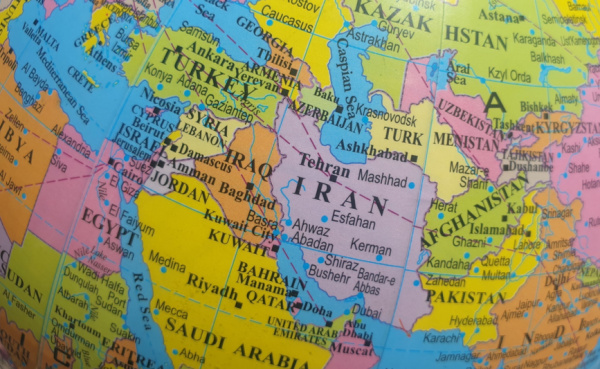
Israel’s Role in the Second Armenia-Azerbaijan War and Its Implications for the Future
By Brenda Shaffer
September 9, 2022
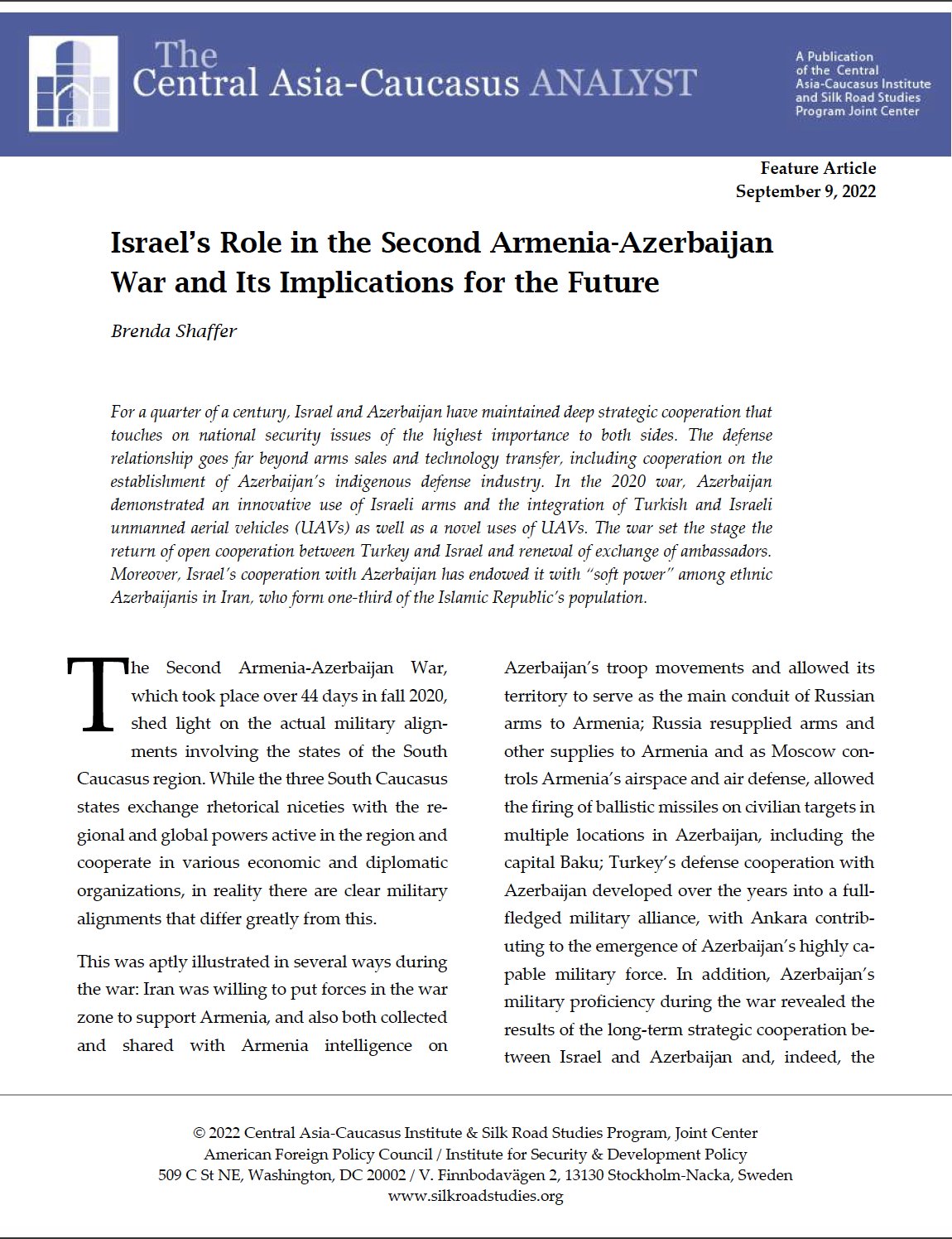 For a quarter of a century, Israel and Azerbaijan have maintained deep strategic cooperation that touches on national security issues of the highest importance to both sides. The defense relationship goes far beyond arms sales and technology transfer, including cooperation on the establishment of Azerbaijan’s indigenous defense industry. In the 2020 war, Azerbaijan demonstrated an innovative use of Israeli arms and the integration of Turkish and Israeli unmanned aerial vehicles (UAVs) as well as a novel uses of UAVs. The war set the stage the return of open cooperation between Turkey and Israel and renewal of exchange of ambassadors. Moreover, Israel’s cooperation with Azerbaijan has endowed it with “soft power” among ethnic Azerbaijanis in Iran, who form one-third of the Islamic Republic’s population.
For a quarter of a century, Israel and Azerbaijan have maintained deep strategic cooperation that touches on national security issues of the highest importance to both sides. The defense relationship goes far beyond arms sales and technology transfer, including cooperation on the establishment of Azerbaijan’s indigenous defense industry. In the 2020 war, Azerbaijan demonstrated an innovative use of Israeli arms and the integration of Turkish and Israeli unmanned aerial vehicles (UAVs) as well as a novel uses of UAVs. The war set the stage the return of open cooperation between Turkey and Israel and renewal of exchange of ambassadors. Moreover, Israel’s cooperation with Azerbaijan has endowed it with “soft power” among ethnic Azerbaijanis in Iran, who form one-third of the Islamic Republic’s population.
Expanding Armenia - Israel Relations: Implications for Iran’s Foreign Policy in the South Caucasus
By Vali Kaleji
September 10, 2020, the CACI Analyst
Close bilateral ties between Iran and Armenia have been overshadowed by sudden expansion of Yerevan-Tel Aviv links. Tehran views Israel as a "third factor" playing a negative role in Iranian relations with its neighbors including Armenia, and threatening security and stability throughout the South Caucasus. Armenian officals mantain that the decision made by Yerevan was known to Tehran at the outset, and the boosting of Yerevan-Tel Aviv ties is not directly against others, including Iran.
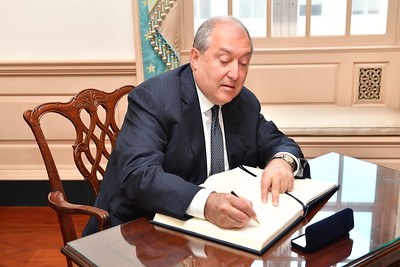
Central Asian Terrorist Groups Join Jihad Against U.S. After Declaration of Jerusalem as Israel's Capital
By Uran Botobekov
February 16, 2018, the CACI Analyst
Terrorist groups from Central Asia reacted strongly to the statement by U.S. President Donald Trump on the recognition of Jerusalem as Israel’s capital. The Uzbek, Uighur, Kyrgyz, Tajik and Kazakh jihadists, who are fighting in the Middle East and Afghanistan, issued several statements with threats against the U.S. Their statements appeared almost in unison with the pronouncements of the international terrorist groups al Qaeda, the Islamic State of Iraq and Syria (ISIS) and the Taliban, who are their ideological inspiration and direct patrons.
